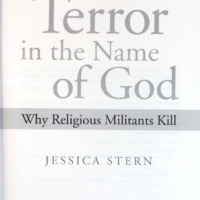-
Title
-
Terror in the name of God : why religious militants kill
-
Description
-
For four years, the author interviewed extremist members of three religions around the world: Christians, Jews, and Muslims. Traveling extensively to refugee camps in Lebanon, to religious schools in Pakistan, to prisons in Amman, Asqelon, and Pensacola, she discovered that the Islamic jihadi in the mountains of Pakistan and the Christian fundamentalist bomber in Oklahoma have much in common. Based on her vast research, she lucidly explains how terrorist organizations are formed by opportunistic leaders who, using religion as both motivation and justification, recruit the disenfranchised. She depicts how moral fervor is transformed into sophisticated organizations that strive for money, power, and attention. Her extensive interaction with the faces behind the terror provide unprecedented insight into acts of inexplicable horror, and enable her to suggest how terrorism can most effectively be countered.
-
Identifier
-
1125171
-
006050532X
-
Creator
-
Stern, Jessica
-
Format
-
1st ed.
-
Source
-
Brian Lamb Booknotes Collection
-
Gift of Brian Lamb, 2011.
-
Catalog record
-
Language
-
eng
-
Date
-
2003
-
Program air date: October 12, 2003
-
Publisher
-
Ecco
-
George Mason University. Libraries. Special Collections & Archives
-
Text
-
Transcription of Annotations
Notes on front endpapers state that the focus of this book is on religious terrorism, mention the effect of being rich or poor; refer to Kerry Noble from Texas, to a visit by the author to the Israel Ministry of Defense, to Musharraf as playing to the West, and to a nun who had a strong influence on the author. Other notes concern two Muslim terrorists - Abu Shanab and Mir Aimal Kansi - who have been killed or executed, and two Christian terrorists - Kerry Noble from Texas and Paul Hill who is incarcerated in a Florida prison. These questions are also included in the notes: "When were most of the interviews conducted for this book? How many after 9/11?" -- "What is a jihadi boss?" -- Annotations by Brian Lamb in the margins and underlining of pertinent phrases throughout the book. -- Examples: p. xviii: "Is there something inherently dangerous about religion? How can it be that the same faith in God that inspired Michelangelo, Mozart, Simone Weil, and Sister Miriam Therese also inspires such vicious crimes? Why, when they read religious texts, do these terrorists find justification for killing innocents, where others find inspiration for charity?" -- p. 38: "Hardship always brings people back to God...A believer should never be afraid of being poor but of being rich. When you become rich, you think only of things. This kills your soul. Islam distinguishes us in that it prepares people to die for the sake of Allah. They are always ready to die for Allah." -- p. 137: "The bottom line, I how understood, is that purifying the world through holy war is addictive. Holy war intensifies the boundaries between Us and Them, satisfying the inherently human longing for a clear identity and a definite purpose in life, creating a seductive state of bliss." -- p. 290: "Because of its opposition to the death penalty, the European Parliament has prohibited extradition of terrorists to the United States for trial without a commitment to waive capital punishment." -- p. 296: "We need to create confusion, conflict and competition among terrorists." -- In addition, 10 pages of notes by Brian Lamb on the author's trips within the United States, to Jordan, Gaza, and Israel, as well as to Indonesia, Pakistan, and Kashmir, and on her meetings and interviews with terrorists in these countries, are laid in.
-
Subject
-
"Terrorism--Religious aspects."
-
"Violence--Religious aspects."
-
Relation
-
Original Booknotes interview
-
Rights
-
This work may be protected by copyright laws and is provided for educational and research purposes only. Any infringing use may be subject to disciplinary action and/or civil or criminal liability as provided by law. If you believe that you are the rights-holder and object to Mason’s use of this image, please contact speccoll@gmu.edu.
 1125171.pdf
1125171.pdf